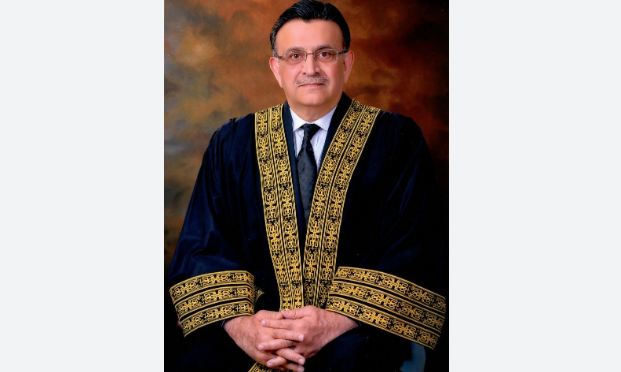Want to conclude case on Monday: CJP

Five-member bench hears the case after Justice Ijaz, Justice Mazahar recues and Justice Athar, Justice Yahya Afridi leave the bench
ISLAMABAD, FEB 27 /DNA/ – In an unexpected development, five judges of the Supreme Court — instead of a nine-member bench — on Monday resumed hearing the suo motu proceedings regarding the delay in the announcement of a date for elections in Punjab and Khyber Pakhtunkhwa.
The original bench included:
Chief Justice of Pakistan (CJP) Umar Ata Bandial Justice Ijazul Ahsan Justice Syed Mansoor Ali Shah Justice Munib Akhtar Justice Yahya Afridi Justice Sayyed Mazahar Ali Akbar Naqvi Justice Jamal Khan Mandokhail Justice Muhammad Ali Mazhar Justice Athar Minallah The bench has been reconstituted to a five-member bench after four judges — Justice Mandokhail, Justice Shah, Justice Afridi and Justice Minallah — wrote dissenting notes in the Feb 23 order and called for the reconstitution of the bench. CJP Bandial, Justice Shah, Justice Mandokhail, Justice Akhtar and Justice Mazhar are currently hearing the case. Justice Ahsan and Justice Naqvi, whose inclusion to the original bench was opposed by the coalition government and the Pakistan Bar Council, as well as Justice Minallah and Justice Afridi have distanced themselves from the bench. “These four judges have shown grace and stepped away from the bench,” said the chief justice at the outset of the hearing. Division in the bench had also emerged in the very first hearing after Justice Mandokhail, who is part of the current bench, objected to the suo motu notice itself as “unjustified”.The reconsituted bench began hearing the case around 1:30pm after two delays in its scheduled timings of 11:30am and 12:30pm. As the proceedings commenced Monday , CJP Bandial said that four members of the bench have disassociated themselves from the bench. “The remaining bench, however, will continue hearing the case. “We will continue the hearing for the interpretation of the Constitution because what the Constitution says depends on its interpretation,” he stated. The apex judge went on to say that the court will again hear the suo motu case at 9:30am tomorrow (Tuesday) and try to wrap it up. CJP Bandial also pointed out that the note of one of Justice Mandokhail had emerged on social media even before the verdict was released. “We will take precautions so that such an incident does not recur in the future.” As the hearing proceeded, Barrister Ali Zafar informed the court that the Punjab governor had sought names from both parties regarding the caretaker chief minister. “But because there was a disagreement between the parties involved, the ECP decided on the name of the CM.” The ECP, he continued, wrote a letter to the governor but the latter declined to propose a date for the election on the grounds that he had not dissolved the assembly.“According to the Constitution, it is compulsory to hold elections within 90 days [of the dissolution of the assemblies] and no constitutional representative can delay the polls further than this,” the lawyer stressed. Here, Justice Mazhar remarked that the governor had “thrown the matter” into the ECP court. “Who appoints the governor?” he asked. Barrister Zafar responded that a governor was appointed with the consent of the president. “There is a difference between a governor dissolving an assembly and an automatic dissolution of the assembly after the completion of its term,” Justice Mazhar said.At that, Barrister Zafar said the court could either order the governor or the ECP to announce the date for elections, highlighting that the meeting between the governor and the ECP team that was held on the directions of the court had ended inconclusively. The president unilaterally announced the election date while analysing the whole situation, the lawyer told the court. For his part, former Punjab Assembly speaker’s counsel said that holding elections was the responsibility of the electoral body. Referring to the Lahore High Court’s Feb 10 order of holding elections in Punjab, Barrister Zafar said that the ECP also did not comply with the court’s orders. “Was the option for the contempt used?” Justice Mansoor Ali Shah asked here. The lawyer replied that a contempt plea was filed on Feb 14. “The ECP was subsequently asked to furnish a reply on the petition,” he added. Zafar further said that the president had written two letters on the matter. The first letter written on Feb 8 contained a direction to the ECP to announce a date for the election, he told the court. “According to the governor, the date for elections will be given by the election commission or another authority,” the lawyer pointed out, adding that he had been instructed to discuss the matter with the governor with respect to security and economic situation. At that, Justice Mazhar said that the order was not mandatory. “To put it briefly, the governor has refused to give a date for elections.“The ECP has responded to the [president’s] letter. The ball is in your court now. You have to decide now,” the judge remarked.=DNA ============« Pak higher education team leaves for Istanbul (Previous News)
(Next News) Two soldiers embrace martyrdom »
Related News

Interior Minister, Sarfraz Bugti Review Balochistan Security Amid Anti-Terror Ops
Quetta, Jul 26: /DNA/ – Federal Interior Minister Mohsin Naqvi and Chief Minister Balochistan SarfrazRead More

FPCCI demands reduction of interest rate to six percent
Despite a Decrease in Inflation, 11% Interest Rate is an Obstacle for Businesses: Atif IkramRead More


Comments are Closed